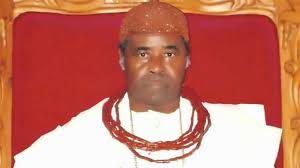Further proofs of Yoruban Linguistic
antiquity:
Universal testimony
By syntactic symbols we mean
items which a community possesses before it meets
outsiders. These items include air, land, water, man, woman, sun;
etc. The Isekiri-Yoruba do not have the names
of these symbols, similar or identical to Bini. Most of these syntactic
symbols are identical or similar in Isekiri-Yoruba and Kamitic.
This clearly proves the ultimate origin of the Isekiri-Yoruba is not from Benin.
. Some
argue about court language, this is not true because
other places, Onitsha, Aboh, Lagos etc where the Binis also had political satellites
never speak the Court
language of Benin. The Onitsha is more related
to Isekiri-Yoruba than Benin.
The linguistic relationship between
Isekiri-Yoruba, Onitsha
Igbo and Ancient Egyptian
There are legends among the
Ebus, Olukumis and the Igalas that the Onitshas are their descendants. The
legend says further that as the people left the Niger- Benue confluence, they
passed through Ebu-Olukumi. Some deflected to Onitsha while some passed what is now Kwale
region to Warri (Ojuma Frank 2006). Isekiri-Yoruba legends also claim that when
the Binis conquered Onitsha
in the seventeenth and eighteenth centuries, the Isekiri-Yoruba Navy's assistance was sought and secured. The legendary founder
of Onitsha was
Chima. The word "Chima" is cognate with the word
“Oritsema” and both seem to be derived from two Egyptian words “Horise” (a
god) And “ma” (know); in Kamitic, in Isekiri-Yoruba
and Onitsha
languages.
Portrait of Isekiri Spirituality
The Linguistic Relationship between Isekiri-Yoruba,
Onitsha Igbo, ancient Egyptian
English
|
Kamitic
|
Isekiri-Yoruba
|
Onitsha Ibo
|
To become/give birth
|
Bi/ba
|
Bi
|
Bu
|
Blow away/go away
|
Fe
|
Fe
|
Fe
|
Smell
|
Em
|
Em
|
Imi(nose)
|
Land
|
Ala/ale
|
Ale
|
Ala
|
Primeval water mother
|
Nen
|
Nene
|
Nem
|
Create
|
Se
|
Se
|
Ke
|
To know
|
Ma
|
Ma
|
Ma
|
Rise
|
Ru/aru
|
Ru
|
Anu
|
Read/talk
|
Ro
|
Ro
|
Kwo
|
The Linguistic Family Proof
The Isekiri-Yoruba and the Bini are in totally
different linguistic groups, while the Isekiri-Yoruba belongs to the Yoruboid
group, the Bini belongs to the Edoid group. The Yoruboid group includes Isekiri-Yoruba,
Yorubas, Ebu, Olukumi and Igala; and members of this group are more related to
the Fon, Aja, Ewe and Ga from Benin
republic to Accra in Ghana, than they are to the
Binis(Adu Boahen). Sagay (1982) comments that the masquerades along this coast stretching
from Warri to Accra
are cognates. This means most of the Peoples: Fon, Aja, Ga,
Ewe, Yoruba and Isekiri-Yoruba are linguistically and religiously related.
e
Gone to God and far,
In this rarest hour we dare
Count on this as rare
e
Gone to God and far,
In this rarest hour we dare
Count on this as rare
 |
| Add caption |
On this linguistic family group hear Alagoa: "From a linguistic
view, too, the Ijo of the
Delta States differs from neighbouring languages. Ijo belongs to the wide Niger
Congo family of African languages along with all the neighbouring languages,
and more particularly to the Kwa sub-family along with the Yoruba (Yoruba, Isekiri-Yoruba),
Ibo, and Edo (Bini, Urhobo-lsoko,
Egene, Epie Atisa, Udekama) within which it
forms a distinct group, the Ijo group" (Alagoa 1977: 335).
On the linguistic family proof, Obayemi says further:
In South-East Yoruba land, extending
from the coastal lagoons
to the Rain forest, are to be found the Yoruba speaking peoples grouped together as Ijebu, Ondo, Isekiri and Ikale. In the northeast is
the kingdom of Owo, sharing many cultural peculiarities with the central or western Yoruba but in many respects
distinct (Ade Obayemi:
1977:220)
by
Augustine Oritseweyinmi Oghanrandukun Olomu (St.Ifa)
&
Eyebira Emmanuel Agharowu(Honsbira)
.




No comments:
Post a Comment